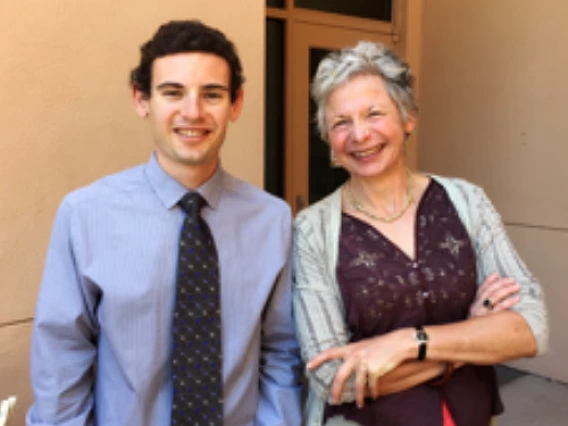
Joey Horowitz, who graduated from the University of Arizona in May 2017, shares why he chose to major in Religious Studies. During his senior year at UA, Joey was accepted into 8 law schools with funding, including three full scholarships. He is attending the Sandra Day O'Connor College of Law at ASU with a full tuition scholarship. (Joey is pictured here with Religious Studies Professor Hester Oberman)
Immediately after I decided to enroll at the University of Arizona I declared a political science major (concentration in law and public policy) and a religious studies minor. Even before college I knew I wanted to go to law school, and I wanted to attend ASU, which is where I am from. I still remember my advisor telling me then that my priorities should be my grades and getting a good LSAT score. He said it would be tough, but if I put in the work, I would make it to ASU law.
Now that I am graduating I can tell you that I met my original goals and will be attending the ASU law honors program on a full scholarship starting this Fall. I did put in the work my advisor asked of me, that is for sure, but I do not think it is what ultimately led to my scholarship.
When Julius Caesar crossed the Rubicon River in 49 BCE, breaking Roman law and starting a civil war, he gave us a metaphor for any miniscule action that initiates an unstoppable chain of events with major consequences. I believe my Rubicon Crossing in regards to achieving my goals in college was actually the moment when I changed my religious studies minor to a major. I had always been interested in the law, but it was not until my religious studies coursework that I found my most passionate interests in the law. After studying topics such as bioethics, growing religious pluralism, and a number of religious traditions different from my own, I had an understanding of many of the ways in which people get into and resolve conflicts, how people cope with the often harsh reality of daily life, and how people deal with tougher issues such as death, loss, and suffering. From this I gained a passion for health law. I want to help people obtain the medical care they need, despite the legal hurtles they may have to jump through because I have learned that the preservation of life permeates all peoples and is usually central to their religious beliefs as well. Additionally, I now have a better understanding of the qualms many different people and groups of people have with health care as a direct result of studying religion.
As a religious studies major, many people have asked me, “What job can you get with a religious studies degree?” This is not the question they should be asking though. A better question would be, “Which jobs will a religious studies major help with?” The answer is any job that works with others.
Organized religious themselves are often the main source of politics in many people’s lives and entire countries throughout the world. Social and behavioral science majors especially cannot go wrong with a religious studies degree. Does anything in the world motivate more people and their behavior than religion?
When it came time to apply and write my personal statement, I wrote about my interest in religious studies and how it led to an interest in health law. I used religious studies professors, not political science, for my letters of recommendation as well. Only about 60% of law school students actually go on to become attorneys, and law schools know this. They want students with rich and diverse backgrounds, because they know their students will not solely go into legal practice. What better major than religious studies could there be for law school since only slightly more than one in a thousand UA students is a religious studies major, and it is a major that covers such a breadth of other areas of study as well? Talk about rich and diverse!
Furthermore, simply declaring a Religious Studies major opened a number of doors in my life. Religious Studies is a Humanities major, and as a Humanities student, many more opportunities for internships and study abroad experiences immediately became available. The range of independent studies also widened greatly. I was able to spend a semester writing a single paper on the unconstitutionality of many courts’ treatment of Native American religions throughout the history of the U.S, a topic that greatly interests me. Though it was a law-related paper, I would not have had the opportunity to complete such research in any of my political science or law classes.
Since I first stepped onto the UA campus my intention to go to law school has never wavered, but I believe my conviction for the law and ultimately my law school scholarship are mostly due to my religious studies major. My Rubicon Crossing opened my eyes to how much more complicated issues can often be than what may arise in a political or legal setting. It also gave me the opportunity to use my law and political science background to study topics, which truly interest me. Having completed college just this week, I can think of no more momentous and meaningful decision while I was in college than my decision to become a Religious Studies major.

